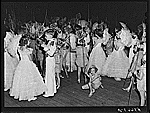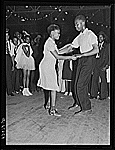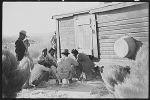| home | pg. 1 | pg. 2 | pg. 3 | pg. 4 | pg. 5 | pg. 6 | pg. 7 | pg. 8 | pg. 9 | pg. 10 | pg. 11 | pg. 12 | pg. 13 | pg. 14 | pg. 15 | pg. 16 | pg. 17 | notes | Transylvania detail 1 | Transylvania detail 2 | Wolcott detail | Bibliography | D. Gorton Homepage | Jane Adams Homepage
|
|
Reading the Photographic Record
by
Jane Adams
D. Gorton
|
Wolcott carefully documented what today we would call the cotton “commodity chain.” In several trips to the Delta, she photographed the cotton being hoed, harvested, ginned, and marketed. She also documented the social life and relationships that revolved around cotton.
|
 Cotton carnival. Memphis, Tennessee. Marion Post Wolcott. May 1940. LC-USF34- 053663-D |
 Saturday afternoon, Clarksdale, Mississippi Delta, Mississippi. Marion Post Wolcott, Oct.? 1939. LC-USF33- 030640-M5 |
| But she, Russell Lee, and the other FSA photographers were interested in far more than technology. Roy Stryker, who headed up the division and sent photographers their assignments, infused his instructions with calls to capture sociological, economic, historical, and geographic information (Trachtenberg 1988:61, Hurley 1972). They were to create a visual record of the times, and a narrative that would give it coherence. Only one of these narratives involved the impact and importance of technology. |
 Cotton carnival, Memphis, Tennessee. Marion Post Wolcott. May 1940. LC-USF34- 053672-D |
|
| Wolcott, in her series on cotton, also photographed the cotton factors, various cotton festivals, blacks spending their earnings from picking cotton. Thumbnails of some of her extensive work can be viewed on this page. |  Day laborers being hired for cotton picking on Mississippi and Arkansas plantations. Between four and six-thirty every morning during the season, near the Hallan Bridge in Memphis, Tennessee, crowds of Negroes in the streets gather and are loaded into trucks by drivers who bid, and offer them anywhere from fifty cents to one dollar per day. Marion Post Wolcott. Oct.? 1939. LC-USF33- 030631-M5 |
 Negroes shooting craps behind tenant house, disposing of their cotton money on Saturday afternoon, Marcella Plantation, Mileston, Mississippi Delta, Mississippi. Marion Post Wolcott, Oct.? 1939. LC-USF33- 030580-M5 |
| home | pg. 1 | pg. 2 | pg. 3 | pg. 4 | pg. 5 | pg. 6 | pg. 7 | pg. 8 | pg. 9 | pg. 10 | pg. 11 | pg. 12 | pg. 13 | pg. 14 | pg. 15 | pg. 16 | pg. 17 | notes | Bibliography | Transylvania detail 1 | Transylvania detail 2 | Wolcott detail |
|
|